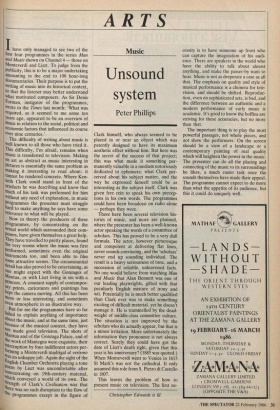ARTS
Music
Unsound system
Peter Phillips
Ihave only managed to see two of the first four programmes in the series Man and Music shown on Channel 4 — those on Monteverdi and Liszt. To judge from the Publicity, this is to be a major undertaking amounting in the end to 100 hour-long documentaries. Their purpose is to put the writing of music into its historical context, so that the listener may better understand what motivated composers. As Sir Denis Forman, instigator of the programmes, Wrote in the Times last month: 'What was required, as it seemed to me some ten Years ago, appeared to be an overview of Music in relation to the social, political and economic factors that influenced its course over nine centuries.'
The difficulty of writing about music is well known to all those who have tried it. This difficulty, I'm afraid, remains when music is transferred to television. Making an art as abstract as music interesting in Pictures is essentially the same problem as making it interesting to read about: it cannot be rendered concrete. Where Ken- neth Clark could stand in front of the artefacts he was describing and know that much of his task was performed for him without any need of explanation, in music Programmes the presenter must struggle hard to make anything he says have some relevance to what will be played. Now in theory the producers of these Programmes, by concentrating on the actual world which surrounded their com- posers, have given themselves a great help. They have travelled to pretty places, found the very rooms where the music was first Performed, sometimes even the original Instruments too, and been able to film some attractive scenes. The circumstantial detail has also proved to be entertaining, as one might expect with the Gonzages of Mantua, or with Liszt living in sin with a Princess. A constant supply of contempor- ary prints, caricatures and paintings has kept the camera moving. All this has been more or less interesting, and sometimes even atmospheric in an illustrative way. t But for me the programmes have so far faded to explain anything of importance about the music, and at the same time, just because of the musical content, they have not made good television. The shots of Mantua and of the Gonzaga Palace, and of the work of Mantegna were exquisite, their Interruption by four indifferent actors per- forming a Monteverdi madrigal al verismo was an unhappy jolt. Again the sight of the English Chamber Orchestra playing a tone poem by Liszt was uncomfortable after concentrating on 19th-century material, which conveyed a world of its own. The Strength of Clark's Civilisation was that !here was no such disruption to the flow of the programmes except in the figure of Clark himself, who always seemed to be placed in or near an object which was patently designed to have its maximum aesthetic effect without him. But here was the secret of the success of that project; this was what made it something per- manently valuable in a medium notoriously dedicated to ephemera: what Clark per- ceived about his subject matter, and the way he expressed himself could be as interesting as the subject itself. Clark was given free rein to speak his own percep- tions in his own words. The programmes could have been broadcast on radio alone — perhaps they were.
There have been several television his- tories of music, and more are planned, where the presenter has been a well-known actor speaking the words of a committee of scholars. This has proved to be a very dull formula. The actor, however picturesque and competent at delivering flat lines, never sounds convincing, and the 'scholars' never end up sounding individual. The result is a heavy seriousness of tone, and a succession of reliable, unleavened facts. No one would believe from watching Man and Music that Alan Bennett was one of our leading playwrights, gifted with that peculiarly English mixture of irony and wit. Potentially he is much better qualified than Clark ever was to make something exciting of difficult material, yet he doesn't manage it. He is trammelled by the dead- weight of middle-class committee culture. The situation is not improved by the scholars who do actually appear, but that is a minor irritation. More unfortunately the information they pronounce is not always correct. Surely they could have got the date of Liszt's death right, given that this year is his anniversary? (1885 was quoted.) When Monteverdi went to Venice in 1613 St Mark's was not the cathedral. It only assumed this role from S. Pietro di Castello in 1807.
This leaves the problem of how to present music on television. The first ne- Christopher Edwards is ill. cessity is to have someone up front who can capture the imagination of his audi- ence. There are speakers in the world who have the ability to talk about almost anything, and make the passer-by want to hear. Music is not as desperate a case as all that. The emphasis on quality and style of musical performance is a chimera for tele- vision, and should be shifted. Reproduc- tion, even on sophisticated sets, is bad, and the difference between an authentic and a modern performance of early music is academic. It's good to know the boffins are striving for these accuracies, but no more than that.
The important thing is to play the most powerful passages, not whole pieces, and not show the performers. On the screen should be a view of a landscape or a contemporary painting of real quality which will heighten the power in the music. The presenter can do all the placing and connecting of the music to its surroundings he likes, a much easier task once the sounds themselves have made their appeal. The programme cannot expect to do more than whet the appetite of its audience, but this it could do uniquely well.














































 Previous page
Previous page